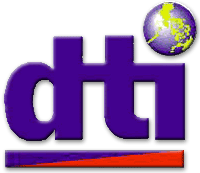Under EO 133 which remains effective up to the present time, the DTI serves as the primary coordinative, promotive, and facilitative arm for trade, industry and investment activities. It acts as the catalyst for intensified private sector activity to accelerate and sustain economic growth through:
A comprehensive industrial growth strategy;
A progressive and socially responsible liberalization and deregulation program
Policies designed for the expansion and diversification of both domestic and foreign trade
On July 19, 1999, President Joseph E. Estrada issued EO 124 authorizing the DTI Secretary to review the DTI systems/operations and initiate structural changes. It also deputized a senior Undersecretary as a special trade negotiator.
Consistent with President Gloria Macapagal-Arroyo's SONA commitments, DTI sees its role as business and consumer champion guided by its 5-point action strategy, namely:
Promoting and developing business, with focus on SMEs
Preparing for the Knowledge Economy
Lowering the cost of doing business
Ensuring consumers get the best value for money, and
Upgrading the quality of DTI governance.
The end goal is to grow and expand Philippine trade and industry as the means to generate jobs and raise incomes, so that Filipinos may enjoy continuing improvements in their quality of life.







